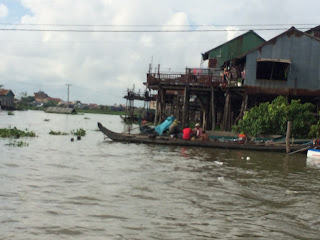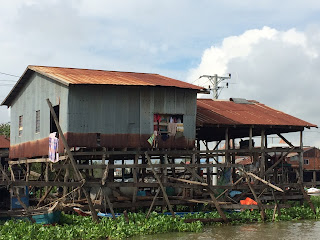It’s time to board the Ama Dara on the
Mekong River
We leave the comforts of our 5 star hotel
in Siem Reap and board a bus to join up with our riverboat. Normally, it’s about a 2 hour ride but
because of low water we have to take a longer route to a place where the boat
can moor.
We stop a couple of times en route, once at
a roadside market selling various insects for eating, eggs with embryos intact
and cooked frogs stuffed with frogs. A
purchase of local candied plums helped us steer clear of the choices mentioned
above.
We board the riverboat, the Ama Dara, our
new home for the next 8 days and 7 nights.
Only two years old, it was specially designed to navigate in relatively
shallow water with a 2M draft. Powered
by 2 800HP engines, we’ll cruise down the Mekong at a 5-7kph speed.
Our room on the first level has a lovely
balcony and large windows for viewing all the sights.
The Mekong River is the 12th
longest river in the world and the 7th longest in Asia. It’s water starts with snow melt in the
Tibetan Himalayas. It’s 1-1.5 km. wide
and depending on the season ranges from 10M to 20M deep.
Our first trip from the boat is by smaller
vessel to view the floating community of about 5,000 people. Fishing is the main activity but as we pass
by the floating structures, everything is happening – raising pigs, keeping
chickens, the equivalent of a floating 711, a floating gas station and even a
floating banquet hall for weddings and other gatherings. It’s all teeming with activity. If you don’t like your neighbor (or they
don’t like you) you can just move on to a different mooring place – a “benefit”
not available to us city dwellers. These
floating homes need constant repair as the bamboo framing poles are renewed in
place every 5 years.
There are many fish species including the
Mekong giant catfish that can be as big as 700 pounds! In our own stores at home we would know about commercially sold Mekong river catfish - sold under the name "Basa".
This lifestyle is being phased out by the
government partly because of sanitation related health problems that leads to a
lower life expectancy for river dwellers.
The plan is to move people to permanent dwellings on shore by 2018 and
they would continue their fishing as normal.
When the water recedes, the rich silt
allows 3 mixed crops to grow.








No comments:
Post a Comment